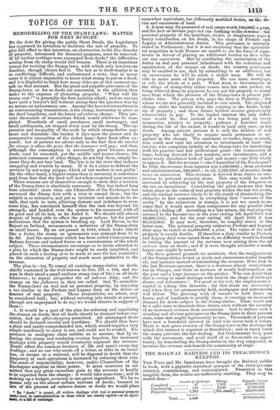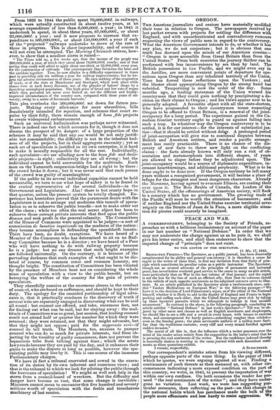THE RAILWAY MADNESS AND ITS TREACHEROUS KEEPERS.
THE Times and Mr. Spackman have brought the Railway public to book, with a gigantic statistical synopsis of the railways con- structed, constructing, and contemplated. Presented in this tangible form, the results are sufficiently startling. They may be stated thus—
Total 1,428 .£700,000,000
Somber of Railways. Mileage. Requisite Capital. Completed 47 2,069 £70,000,000 Constructing 118 3,543 67,000,000
Projected 1,263 [Not stated]...... 563,000,000 From 1823 to 1844 the public spent 70,000,0001. in railways, which were actually constructed in about twelve years, at an average expenditure of less than 6,000,000/. a year ; in 1845 it undertook to spend, in about three years, 67,000,0004 or about 22,000,000/. a year ; and it now proposes to increase that ex- penditure to 560,000,0004 or about 150,000,000/. a year if each of the " projected " railways undertake to move at the rate of those in progress. This is sheer impossibility, and of course it will not even be attempted. The Morning Chronicle strives, how- ever, to show that a needless alarm is raised.— " The Times told us, a few weeks ago, that the income of the people was 300,000,0001. a year, of which they saved about 70,000,0001. yearly; and of that saving they could well afford to apply about one-third, or 23,000,0001. every year, for the construction of railroads. Our contemporary thus furnishes the bane and the antidote together. True, he now alludes to a difficulty experienced in times past in providing only six millions a year for railway improvements; but he for- gets the adverse circumstances of those years. He says nothing of the stagnation of trade, or of the riots at Manchester and Stockport, which took place while shares were at such heavy discount, nor of the plunder of bakers shops by a famishing unemployed population. The high price of bread and low rate of wages which then prevailed are never even hinted at, nor the different and highly- improved circumstances of the country now, compared with those years of ad- versity, owing to a series of favourable harvests."
This plea overlooks the 560,000,000/. set down for future pro- jects. Making every allowance for mere absurdities, bills
fraudulently intended for rejection, and schemes that court re- pulse by their folly, there remain enough of bona fide projects to create widespread embarrassment.
Such an universal hallucination was perhaps never witnessed. There is indeed one fact which accounts for it, though it does not disarm the prospect of its danger: of a large proportion of the
schemes it may be said that any one would be not only justifi- able but commendable; the difficulty is not in the inherent bad-
ness of all the projects, but in their aggregate enormity ; yet as each set of speculators is justified in its own enterprise, it is hard to make it morally responsible for all the rest. Individually,
each speculator—we are alluding now to the bona fide and desir-
able projects—is right ; collectively they are all wrong : but the individual cannot be held answerable for the multitude. Each man on the Yarmouth suspension-bridge had a right to be there : the crowd broke it down ; but it was never said that each person of the crowd was guilty of manslaughter. If the public in its several individual capacities cannot be held accountable, we turn to see what hope of safety is to be found in the central representative of the several individuals—in the Government and Legislature. Alas! there is but scanty hope in that quarter, unless the present system be totally changed. Ex- perience has heretofore proved that the paramount desire with the Legislature is not to arrange and moderate this tumult of specu- lation so as to subserve the public benefit—not to make order out
of the chaos ; while too often the real secret object has been to subserve those corrupt private interests that feed upon the public disease and seek profit in the general calamity. The Committees of the House of Commons were appointed to be judges—a sort of commission de lunatico inguirendo on the madness of the nation: they became accomplices in defrauding the spendthrift lunatic.
There have been, no doubt, exceptions. We have heard of a Member of the Commons who has determined to sit on no Rail- way Committee because he is a director ; we have heard of a Peer who will have nothing to do with railway property because he is a judge : but no one dreams that such bright examples are followed universally. On the contrary, it is because of the pervading darkness that such examples of what ought to be dic- tated of course, by common sense and common honesty, are thought bright. The constitution of Committees has been vitiated by the presence of Members bent not on considering the whole mass of speculation with a view to the public benefit, but on betraying the welfare of the country for the gain of private speculators. They cheerfully connive at the enormous abuses in the conduct of coun.el, who are heard on sufferance, and should be kept to their duty. The apology for the onesided partisanship of legal advo- cates is, that it practically conduces to the discovery of truth if several wits are separately engaged in discovering what can be said
all round : but counsel are offered, and take, enormous fees, not for finding out what can be said, but for staying away : the mul- titude of Committees was so great, last session, that leading counsel
could not attend half or quarter the number for which they were
retained ; they were retained, not that they might advocate, but that they might not oppose ; paid. for the suppressio von—if
counsel do tell truth. The Members, too, anxious to pamper
counsel who can do so much for private interests, tied from ob- jecting. by the timidity of guilty consciences, dare not prevent the
loquacious tribe from talking against time ; which the astute lawyersdo because they are paid by the day, and it enhances their gains to make the dispute as long as possible, however the spe- culating public may lose by it. This is one source of the immense Parliamentary charges. We have in fact a tribunal enervated and cowed in the execu- tion of its duties by its own inherent and conscious vices ; and that is the tribunal to which we look for piloting the public through the hurricane of speculation! We might as well seek help in the storm from a council-board of wreckers. But the difficulty and danger have become so vast, that some change is inevitable : Ministers cannot mean to encounter this five hundred and seventy millions worth of speculation with the feeble and treacherous machinery of last session.



























 Previous page
Previous page